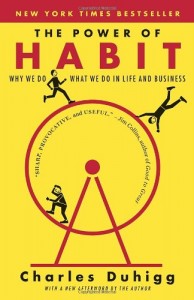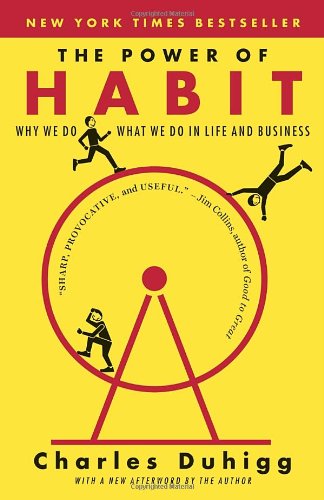 I was recommended this book by one of my podcast guests, who raised a bunch of money for his new venture and has transformed his life.
I was recommended this book by one of my podcast guests, who raised a bunch of money for his new venture and has transformed his life.
I didn’t get around to reading it for a while, but I wish I had picked it up sooner!
The Power of Habit, by Charles Duhigg was an awesome book! I guess a lot of people also think that, because it has over 3,000 reviews on Amazon.
Personally, I like to think of people as though they are running on an operating system. In the same way that you need to manage the processes in your company, you also need to manage the systems in your daily life.
Most of our lives are a cumulation of experiences. You don’t experience success or continued happiness all at once. It’s built up through a series of repeated activities, a very specific mindset, and a particular focus.
Habits are the mini subroutines that are responsible for the majority of our thinking throughout the day. By mastering your habits, you can control your output each day and change your life.
I’m going to list out the reasons to buy or not buy this book and then highlight some of the notes I made and things I underlined.
You should check out this book if:
- You want to change bad habits in your life
- You want to create good habits that support success and happiness
- You’re curious about how the brain operates
- You want to influence the behavior of your customers or people in your life
- You want to learn how societies change and adopt new habits
You should ignore this book if:
- You’ve already read up a lot on psychology and are familiar with key studies.
- The only recurring theme I found among negative reviews was that there is too much “fluff,” but I don’t really agree with that. I thought it was valuable and recurring examples hammered into my head this new mental model.
This is one of those books that won’t improve your life unless you take action. Be sure to apply some of the findings in your own life and go through some of the exercises that the author recommends!
Notes and things I underlined
“The conviction that she had to give up smoking to accomplish her goal had touched off a series of changes that would ultimately radiate out to every part of her life.”
The military trains soldiers by creating new habits in them.
If you want to make an action easy, then make it a routine.
At some point, you cede control of your mental processes to habit.
Cue, routine, and reward.
Recognize habit loops as they grow.
Find the simple and obvious cue to create a new habit (toothbrushing) and clearly define the rewards.
Pick out the emotion that you want them to feel.
“Shapes on the monitor had become a cue not just or pulling a lever, but also for a pleasure response inside the monkey’s brain.” Monkey gets unhappy, angry, or mopey. This is the biological equivalent of a “craving.” When he didn’t get it, he got anger or depression.
Craving is the anticipation of a reward.
Habits are so powerful because they create cravings over time. These cravings appear gradually.
Cravings can force your brain into autopilot even in the face of loss of reputation, job, home, or family.
“But to overpower the habit, we must recognize which craving is driving the behavior.” “If we’re not conscious of the anticipation, then we’re like the shoppers who wander, as if drawn by an unseen force, into Cinnabon.”
“Inistead of eliminating scents on dirty fabrics, it became an air freshener used as the finishing touch, once things are already clean.”
Figure out what people crave.
You should build craving a sensation into your product. “The burn means it’s working.”
“Consumers need some kind of signal that a product is working.”
You can make your craving for something a mild obsession, which can make you stay on track and crowd out temptations.
Almost any behavior can be transformed if the cue and reward stay the same.
“Champions don’t do extraordinary things. They do ordinary things, but they do them without thinking, too fast for the other team to react. They follow the habits they’ve learned.”
Changing ways for coping with stress and anxiety
“Most people’s habits have occurred for so long they don’t pay attention to what causes it anymore.”
The one missing element for most people that makes them able to change their habits is belief. You must believe you can do it. For many alcoholics, it’s the fact that a higher power entered their life, like God. “Eventually, they’ll have a bad day, and no new routine is going to make everything seem okay. What can make a difference is believing that they can cope with that stress without alcohol.”
Groups can help you suspend disbelief.
Stress or anxiety can make you fall back on your habits.
“We know that a habit cannot be eradicated – it must, instead, be replaced.”
Keystone habit is a habit that spills into other areas of your life.
Create small wins.
“This is the final way that keystone habits encourage widespread change: by creating cultures where new values become ingrained.”
“Dozens of studies show that willpower is the single most important keystone habit for individual success.”
“By making people use a little bit of their willpower to ignore cookies, we had put them into a state where they were willing to quit much faster.”
“Willpower isn’t just a skill. It’s a muscle, like the muscles in our arms or legs, and it gets tired as it works harder, so there’s less power left over for other things.”
“They focused on how patients would handle a specific moment of anticipated pain.”
“A routine for employees to follow when their willpower muscles went limp…how to respond to specific cues.”
“When people are asked to do something that takes self-control, if they think they are doing it for personal reasons – if they feel like it’s a choice or something they enjoy because it helps someone else- it’s much less taxing. If they feel like they have no autonomy, if they’re just following orders, their willpower muscles get tired much faster.”
People bring more energy and focus to their jobs when they feel like they have agency. People want to be in control of their lives.
“Reform is usually possible only once a sense of crisis takes hold. A wise leader often prolongs a sense of emergency on purpose.”
“Pregnant women and new parents, after all, are the holy grail of retail. There is almost no more profitable, product-hungry, price-insensitive group in existence.”
People don’t want to feel like you’re reading their mind. It’s creepy. But they do want to be lead to what they want.
“People’s buying habits are more likely to change when they go through a major life vent.”
“Changing residence, getting married or divorced, losing or changing a job, having someone enter or leave the household are life changes that make consumers more vulnerable to intervention by marketers.”
“Our brains are designed to prefer auditory patterns that seem similar to what we’ve already heard.”
“To change people’s diets, the exotic must be made familiar. And to do that, you must camouflage it in everyday garb.”
“If you dress a new something in old habits, it’s easier for the people to accept it.”
People want to visit a place that will satisfy their social needs and other needs.
“There’s a natural instinct embedded in friendship, a sympathy that makes us willing to fight for someone we like when they are treated unjustly. Studies show that people have no problem ignoring strangers’ injuries, but when a friend is insulted, our sense of outrage is enough to overcome the inertia that usually makes protests hard to organize.”
Most people want to maintain their social standing and respond to peer pressure.
You must change the habits of a group to create a movement or to get them marching in the same direction. Align their habits or values.
“I almost won” can give you the same feeling that you won.
Framework for changing a habit
- Identify the routine
- Experiment with rewards
- Isolate the cue
- Have a plan
